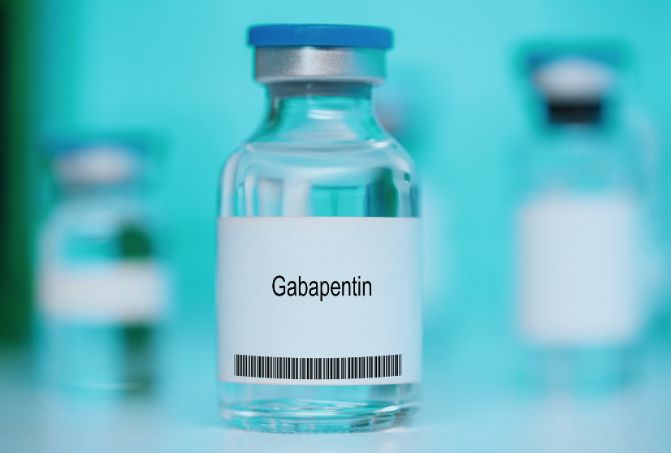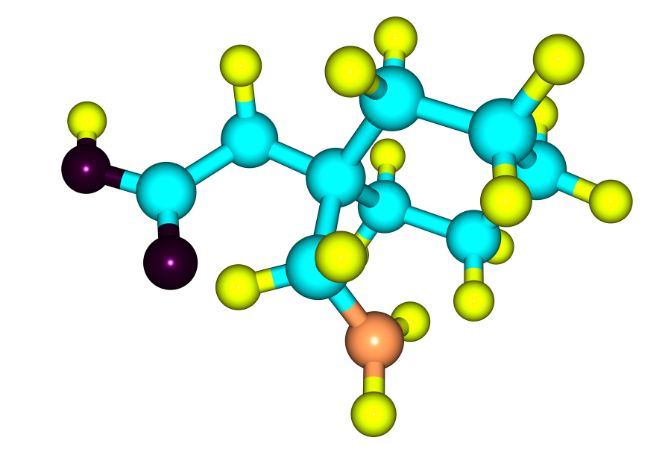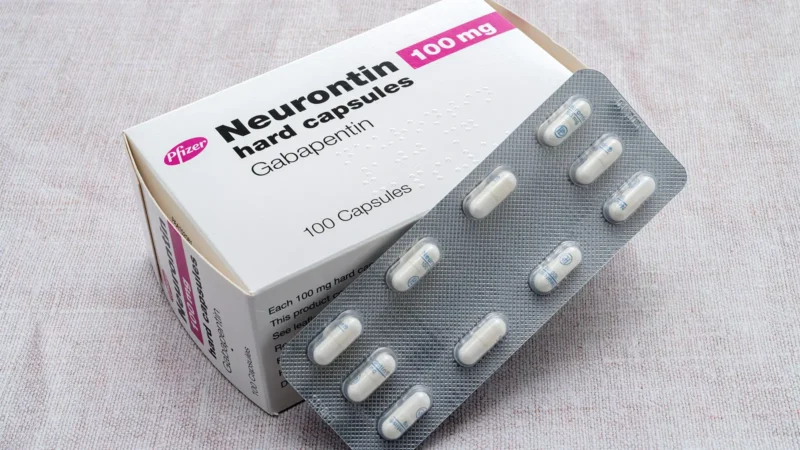Alcohol Withdrawal Syndrome (AWS) is a challenging condition that arises when an individual abruptly reduces or stops heavy and prolonged alcohol consumption. The symptoms can range from mild anxiety and tremors to severe complications such as seizures and delirium tremens.
Gabapentin, a medication originally approved for the treatment of epilepsy, has emerged as a promising adjunct in the management of AWS. Now, we want to address the critical aspects of Gabapentin as a treatment option for AWS, exploring its efficacy, benefits, and considerations.
What is Gabapentin?
Gabapentin, originally developed for the treatment of epilepsy, has found its place in the pharmacopeia for a variety of uses. It originated in the early 1990s, and it was approved by the FDA for seizure control. Clinicians soon noticed its benefits in neuropathic pain and it became widely used for this off-label purpose.
The mechanism of action of Gabapentin is not entirely understood, but it is known to bind to the alpha-2-delta subunit of voltage-gated calcium channels in the central nervous system. This binding inhibits excitatory neurotransmitter release, which may explain its anticonvulsant and analgesic effects.
Gabapentin’s Role in Treating AWS
Alcohol Withdrawal Syndrome (AWS) presents a challenging spectrum of symptoms for patients undergoing alcohol detoxification. Gabapentin has emerged as a promising agent in managing these symptoms. It is thought to restore the neurochemical balance disrupted by alcohol cessation.
Clinical studies have shown that Gabapentin can reduce the severity of withdrawal symptoms and may even influence the reward pathways associated with addiction.
Compared to benzodiazepines, the traditional treatment for AWS, Gabapentin offers a favorable profile, particularly for patients with a history of substance abuse, as it has a lower potential for addiction.
Benefits of Using Gabapentin for AWS
The therapeutic benefits of Gabapentin in the context of AWS are noteworthy.
| Benefit | Description |
|---|---|
| Reduction in Withdrawal Symptoms | Gabapentin can significantly reduce the severity of withdrawal symptoms, making the detoxification process more comfortable for patients. |
| Decrease in Alcohol Cravings | Patients may experience a reduction in the urge to consume alcohol, which can be a pivotal factor in preventing relapse. |
| Improved Sleep Patterns | Gabapentin can help normalize sleep patterns disrupted by alcohol withdrawal, contributing to better overall recovery outcomes. |
| Mood Stabilization | The medication has mood-stabilizing properties that can help alleviate the mood swings often associated with AWS. |
Potential Side Effects and Concerns
While Gabapentin is generally well-tolerated, it does come with potential side effects such as dizziness, fatigue, and ataxia. These effects are often dose-dependent and may diminish with time. Gabapentin can also interact with other medications, necessitating careful consideration when used in polypharmacy.
There are concerns about the misuse of Gabapentin, especially in populations with a history of substance abuse, although its potential for dependency is lower than that of traditional sedatives used for AWS.
Dosage and Administration
The dosage of Gabapentin for AWS varies, with some protocols starting at 300 mg and titrating up to 1200 mg per day as needed. The duration of treatment is typically determined by the severity of the withdrawal symptoms and the patient’s response to the medication.
It is crucial that Gabapentin is administered under medical supervision, as abrupt cessation can lead to withdrawal symptoms similar to those of alcohol and benzodiazepines.
Alternative Treatments for AWS
Alternative treatments for Alcohol Withdrawal Syndrome (AWS) encompass a diverse range of options beyond pharmacotherapy. These alternatives are critical, as they provide avenues for individuals who may not respond well to medications or who prefer non-pharmacological approaches.
AWS treatments are inclusive of evidence-based psychotherapies, which aim to address the psychological underpinnings of addiction, and holistic practices that seek to heal the mind and body collectively.
The efficacy of these treatments can vary widely among individuals, but they are united by a common goal: to ease the process of withdrawal and promote long-term recovery.
| Treatment Category | Description | Key Points |
|---|---|---|
| Benzodiazepines | Reduce the risk of severe withdrawal symptoms. | Potential for dependency and sedation. |
| Anticonvulsants (e.g., carbamazepine, valproate) | Stabilize neuronal activity. | May have a lower abuse potential compared to benzodiazepines. |
| Beta-blockers and alpha-2 agonists | Help control autonomic symptoms like rapid heart rate and high blood pressure. | Used to manage physical symptoms of AWS. |
| Psychological support | Cognitive-behavioral therapy addresses psychological withdrawal and cravings. | Essential for long-term recovery and relapse prevention. |
| Holistic approaches | Acupuncture and meditation may reduce withdrawal symptoms and improve well-being. | Alternative methods to support traditional treatments. |
| Nutritional support | Addresses deficiencies common in alcohol dependency. | Thiamine supplementation is critical for preventing Wernicke-Korsakoff syndrome. |
| Structured detoxification programs | Provide a safe environment with medical supervision. | Can immediately address withdrawal complications. |
| Support groups and peer counseling (e.g., AA) | Offer social support and shared experiences. | Can be a key component of sustained abstinence and recovery. |
The Role of Counseling and Support
Medication is just one piece of the puzzle in AWS treatment. Counseling and support play a critical role in addressing the psychological aspects of addiction.
Cognitive-behavioral therapy, motivational interviewing, and participation in support groups like Alcoholics Anonymous can provide the emotional support and coping strategies necessary for long-term recovery.
Integrating these modalities with medications like Gabapentin can lead to more comprehensive care and better outcomes.
Patient Testimonials and Case Studies

Personal accounts from patients who have used Gabapentin for AWS often highlight the medication’s efficacy in alleviating the discomfort of withdrawal. Case studies reflect a range of experiences, with many patients achieving sustained abstinence.
Success rates can vary, and some individuals face challenges such as side effects or the need for prolonged treatment.
These real-life stories underscore the importance of a personalized approach to AWS treatment, one that balances the benefits of medications like Gabapentin with the realities of each patient’s journey to recovery.
FAQs
What should I do if I miss a dose of Gabapentin during AWS treatment?
If you miss a dose, take it as soon as you remember unless it’s almost time for your next dose. In that case, skip the missed dose and continue with your regular schedule. Do not double up doses. Always follow the specific guidance provided by your healthcare provider.
Can Gabapentin lead to withdrawal symptoms if stopped abruptly?
Yes, stopping Gabapentin suddenly can lead to withdrawal symptoms. It’s important to taper off the medication under medical supervision rather than stopping it abruptly.
Are there any lifestyle changes I should consider while taking Gabapentin for AWS?
Adopting a healthy lifestyle can support recovery from AWS, including a balanced diet, adequate hydration, regular exercise, and good sleep hygiene. Avoiding alcohol and drugs is also crucial.
How can I tell if Gabapentin is working for my AWS?
Improvement in AWS symptoms, such as reduced anxiety, agitation, and better sleep patterns, can indicate that Gabapentin is working. Regular follow-ups with your healthcare provider are important to assess the medication’s effectiveness and make any necessary adjustments.
A Wrap Up
Gabapentin has shown considerable promise as a treatment for Alcohol Withdrawal Syndrome, offering a beacon of hope for many grappling with the challenges of alcohol dependency. Its ability to alleviate withdrawal symptoms, reduce cravings, and stabilize mood makes it a valuable tool in the arsenal against AWS.
As with any medication, it is not without its potential side effects and the need for careful administration under medical supervision.







